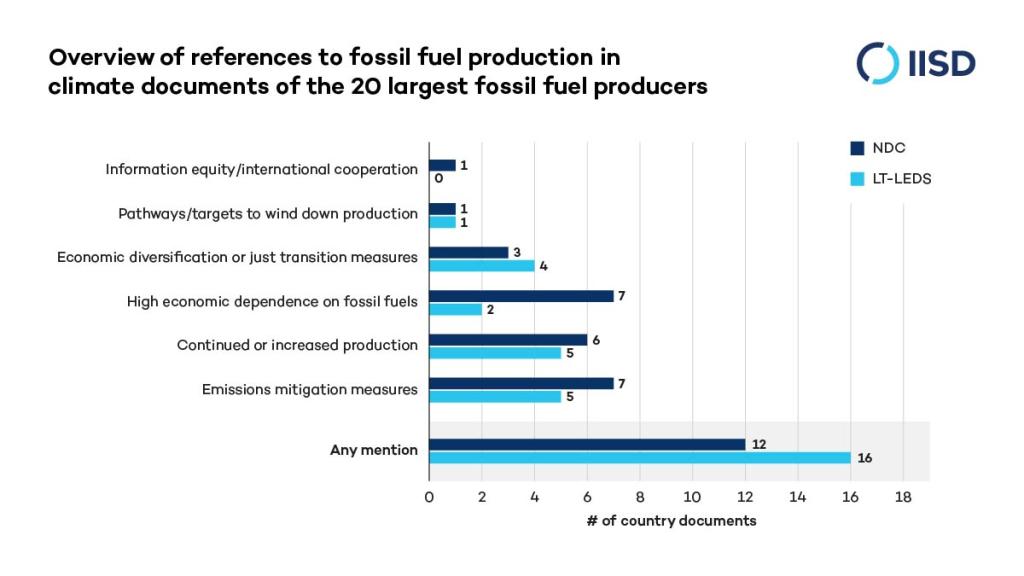Report Calls on Fossil Fuel Producers to Map “Transition Away” in NDCs
The next round of national climate plans due in 2025 must reflect the global stocktake outcome
June 13, 2024 — As interim climate talks draw to a close in Bonn, Germany, attention is turning to national action. Governments are due to submit the next generation of national climate plans, or NDCs, in 2025. These will be the first since the international agreement at COP 28 to transition away from fossil fuels.
Experts from the International Institute for Sustainable Development (IISD) have analyzed the last round of NDCs from the top 20 biggest fossil fuel-producing countries (FF20): Algeria, Australia, Brazil, Canada, China, Germany, India, Indonesia, Iran, Iraq, Kuwait, Norway, Poland, Qatar, Russia, Saudi Arabia, South Africa, Turkey, United Arab Emirates, and the United States. Together, these account for 93% of global coal production, 80% of oil, and 77% of gas.
They found a third (seven) of the FF20 make no mention of fossil fuel production in their NDCs. Six stated an intention to continue or increase production. Only one, the EU, representing coal producers Germany and Poland, mentioned a pathway to decrease production.

Natalie Jones, policy advisor at IISD, says, “The science is clear: there is no room for new fossil fuel infrastructure in any credible pathway to Paris goals, and fossil fuel production and consumption must be rapidly phased out. The time is now for fossil fuel-producing countries to align their climate plans with what the world urgently needs.”
The report identifies five elements governments can include in NDCs and long-term strategies to reflect the outcome of the global stocktake at COP 28:
- Information on national fossil fuel production, future production plans, reserves, and support.
- Targets and pathways to wind down fossil fuel production. This could be in the form of a commitment to reduce or phase out fossil fuel production by a target date.
- Policies and measures to disincentivize or constrain fossil fuel production, for example, moratoriums on development, production and export caps, reform of production subsidies, and increased taxes on extraction.
- Policies and measures to support workers and communities in the transition and diversify the economy away from fossil fuel production.
- Information related to equity and international support and cooperation.
Paola Yanguas Parra, policy advisor at IISD, says, "In a world that has agreed to transition away from fossil fuels, producers that keep mining and drilling are vulnerable to market shocks. NDCs and long-term strategies can be used to guide an orderly transition and attract investment into alternative growth sectors.”
Notes for editors
- How transition away from fossil fuel production can be included in third-generation NDCs and LT-LEDS
- COP 28 Agreement Signals “Beginning of the End” of the Fossil Fuel Era (UN Climate Change press release)
- No New Fossil Fuel Projects: The logical first step in a transition to clean energy
Media Contact
Megan Darby, senior communications officer, IISD: mdarby@iisd.org
About IISD
The International Institute for Sustainable Development (IISD) is an award-winning independent think tank working to accelerate solutions for a stable climate, sustainable resource management, and fair economies. Our work inspires better decisions and sparks meaningful action to help people and the planet thrive. We shine a light on what can be achieved when governments, businesses, non-profits, and communities come together. IISD’s staff of more than 250 experts come from across the globe and from many disciplines. With offices in Winnipeg, Geneva, Ottawa, and Toronto, our work affects lives in nearly 100 countries.
You might also be interested in
December 2024 | Carbon Minefields Oil and Gas Exploration Monitor
In November 2024, 23 oil and gas exploration licences were awarded across five countries, with Russia granting the licences that account for the largest portion of embodied emissions.
The Cost of Fossil Fuel Reliance
Government support for fossil fuels reached at least USD 1.5 trillion in 2023, new data shows.
Ending Export Credits for Oil and Gas: How OECD countries can end 2024 with a climate win
For a year now, Organisation of Petroleum Exporting Countries (OECD) governments have been negotiating an agreement that could put an end to oil and gas export finance. Following the acrimony in Baku, this would be a very real way for the OECD to show policy coherence, respond to calls from the poorest countries to stop subsidizing fossil fuels, and shift public finance to solutions.
November 2024 | Carbon Minefields Oil and Gas Exploration Monitor
In October 2024, 20 oil and gas exploration licences were awarded across three countries, with a significant portion granted by Brazil.